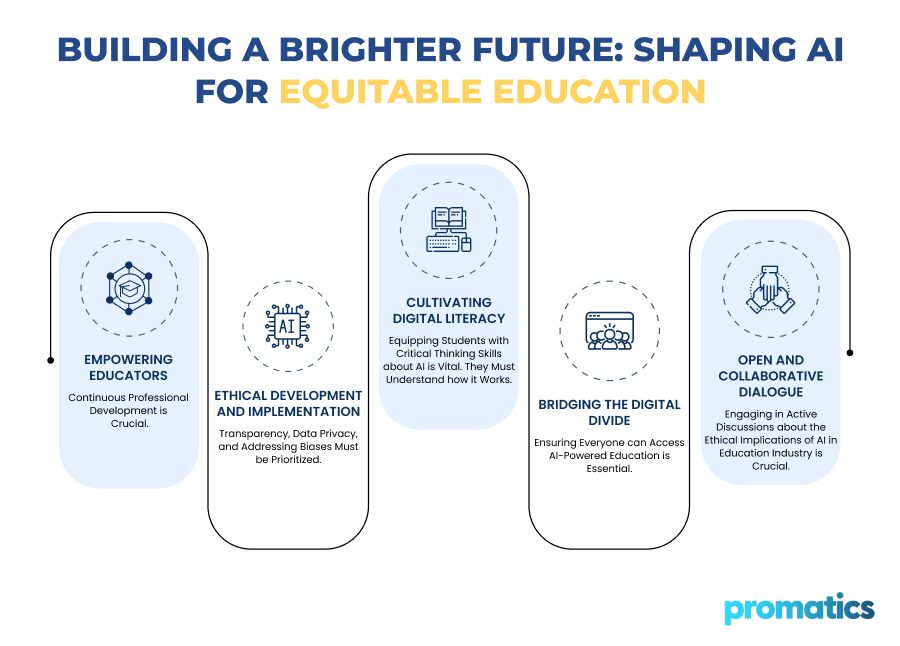Shaping the Future of Education: Unveiling the Impact of Artificial Intelligence
Table of Contents
- Promising Prospects: Rethinking the Learning Experience
- Challenges and Risks: Navigating a Responsible Path
- Building a Brighter Future: Shaping AI for Equitable Education
- Frequently Asked Questions
The field of education is standing at a pivotal moment, ready for a revolutionary journey propelled by Artificial Intelligence (AI). This digital wave can redefine classrooms, customize learning experiences, and introduce unprecedented opportunities for educators and students. However, akin to any transformative force, the integration of AI in education brings opportunities, challenges, and ethical considerations. Let’s delve deeper into this evolving landscape, exploring the thrilling potential of AI while acknowledging the obstacles we must surmount to construct a genuinely fair and enriching future for education and combat the challenges in education.
Promising Prospects: Rethinking the Learning Experience
Envision a classroom where AI-driven learning guides function as personal tutors, tailoring individualized paths for each student. They gently guide struggling learners, providing targeted support and customized exercises. These guides present challenging modules for gifted minds, fueling intellectual curiosity and pushing them to realize their full potential. Empowered by AI algorithms that evolve alongside students, this personalized approach ensures that no one is left behind in a standardized curriculum.
With the beginning of Artificial Intelligence (AI), the way we learn has been revolutionized, going beyond traditional textbooks and offering immersive experiences.
Virtual Reality (VR) field trips enable students to explore ancient Rome’s busy streets or dive into the depths of the Great Barrier Reef. Augmented Reality (AR) superimposes historical figures’ images onto classroom walls, bringing them to life. This makes learning more tangible and engaging. Interactive simulations enable students to dissect virtual frogs in biology class, conduct ethical experiments in social studies, or test gravity on the lunar surface in physics – all within a secure virtual environment. These engaging experiences ignite a love for learning, solidify knowledge in ways traditional methods often struggle to achieve, and cultivate critical thinking skills through interactive exploration.
Impact of Artificial Intelligence extends beyond individual learners, emerging as a powerful ally for educators. Picture AI systems handle time-consuming administrative tasks like grading assessments, analyzing student data to identify challenging areas, and even generating personalized learning materials tailored to specific needs. This impact of Artificial Intelligence liberates educators’ time, allowing them to focus on their core mission: guiding, mentoring, and inspiring their students. Envisage collaborative classrooms where AI facilitates differentiated instruction, offers real-time feedback, identifies struggling students for targeted support, and empowers teachers to personalize their approach to cater to diverse learning styles. This human-machine collaboration creates a dynamic learning environment where every student flourishes.
Challenges and Risks: Navigating a Responsible Path
The excitement surrounding AI in the education industry is undeniable, but a dose of reality is crucial. While AI holds immense potential to personalize learning, enhance experiences, and support educators, we must navigate it with ethical considerations firmly in mind.
Data privacy reigns supreme
Safeguards are critical to ensure that student information is used responsibly and protected from misuse. Biases ukryte in algorithms can deepen existing inequalities. We must carefully curate data and use diverse training sets to promote inclusivity. The digital divide threatens to become a new barrier. Bridging this gap and ensuring everyone has access to AI-powered learning is essential for true progress.
Another catch to avoid overreliance on AI
Critical thinking and problem-solving skills could only improve if students become more dependent on technology for information and analysis. We need to strike a balance, using AI to empower learning, not replace it. Educators must foster a spirit of inquiry and questioning, encouraging students to analyze information, evaluate its validity, and develop their unique perspectives.
Embracing the impact of Artificial Intelligence in education requires us to walk a tightrope. But with careful planning, ethical implementation, and a focus on inclusivity, we can ensure this transformative technology unlocks its full potential, creating a brighter and more equitable learning landscape for every student.
Building a Brighter Future: Shaping AI for Equitable Education
The fate of education with AI isn’t predetermined; it’s ours to define. To unlock its full potential while mitigating risks, we need a multifaceted action plan to understand the future of AI in overcoming the challenges in education:
1. Empowering educators
Continuous professional development is crucial. Educators need the skills and knowledge to effectively integrate AI into their classrooms, recognizing its strengths and limitations.
2. Ethical development and implementation
Transparency, data privacy, and addressing biases must be prioritized. We must develop and implement AI tools to overcome the challenges in education with these principles at the core.
3. Cultivating digital literacy
Equipping students with critical thinking skills about AI is vital. They must understand how it works, analyze its outputs, and develop healthy digital habits to navigate this evolving landscape.
4. Bridging the digital divide
Ensuring everyone can access AI-powered education is essential. We must address the digital range with initiatives like providing affordable technology, developing offline learning tools, and fostering community-based solutions.
5. Open and collaborative dialogue
Engaging in active discussions about the ethical implications of AI in education industry is crucial. Educators, parents, policymakers, and technology developers must be involved in shaping its responsible implementation.
By tackling these problems head-on and prioritizing ethical considerations, we can ensure AI becomes a positive force in overcoming the challenges in education. It can democratize learning, enhance the teaching experience, and empower every student to reach their full potential. While the future of AI in education industry holds unknowns, it also harbors immense possibilities for a brighter, more equitable, and genuinely transformative learning landscape.
Frequently Asked Questions
Will AI replace teachers?
AI is not intended to substitute teachers. Instead, it will enhance their capabilities by handling administrative tasks and providing individualized student support, allowing teachers to concentrate on more profound learning experiences and personalized guidance.
How will AI handle the digital divide in education?
Bridging the digital divide is crucial for equitable access to AI-powered education. Initiatives like providing affordable hardware, training educators on incorporating technology, and creating offline learning tools can all play a role in ensuring everyone benefits from this transformative technology.
Can AI be biased?
Yes, AI algorithms can perpetuate biases in the data they are trained on. It’s crucial to use diverse training data sets and carefully monitor for potential biases to ensure AI tools are fair and inclusive for all learners.
What are the ethical considerations of using AI in education?
Data privacy, student autonomy, and responsible development are critical ethical considerations. Transparency about data use, ensuring students have control over their educational data, and developing AI tools that cater to various needs are essential for ethical implementation.
What can we do to prepare for the future of AI in education?
Continuous professional development for educators on integrating AI tools effectively, enabling technology literacy among students, and fostering public discourse about the ethical implications of AI in education are crucial steps toward navigating this complex landscape.
Also read
Still have your concerns?
Your concerns are legit, and we know how to deal with them. Hook us up for a discussion, no strings attached, and we will show how we can add value to your operations!

